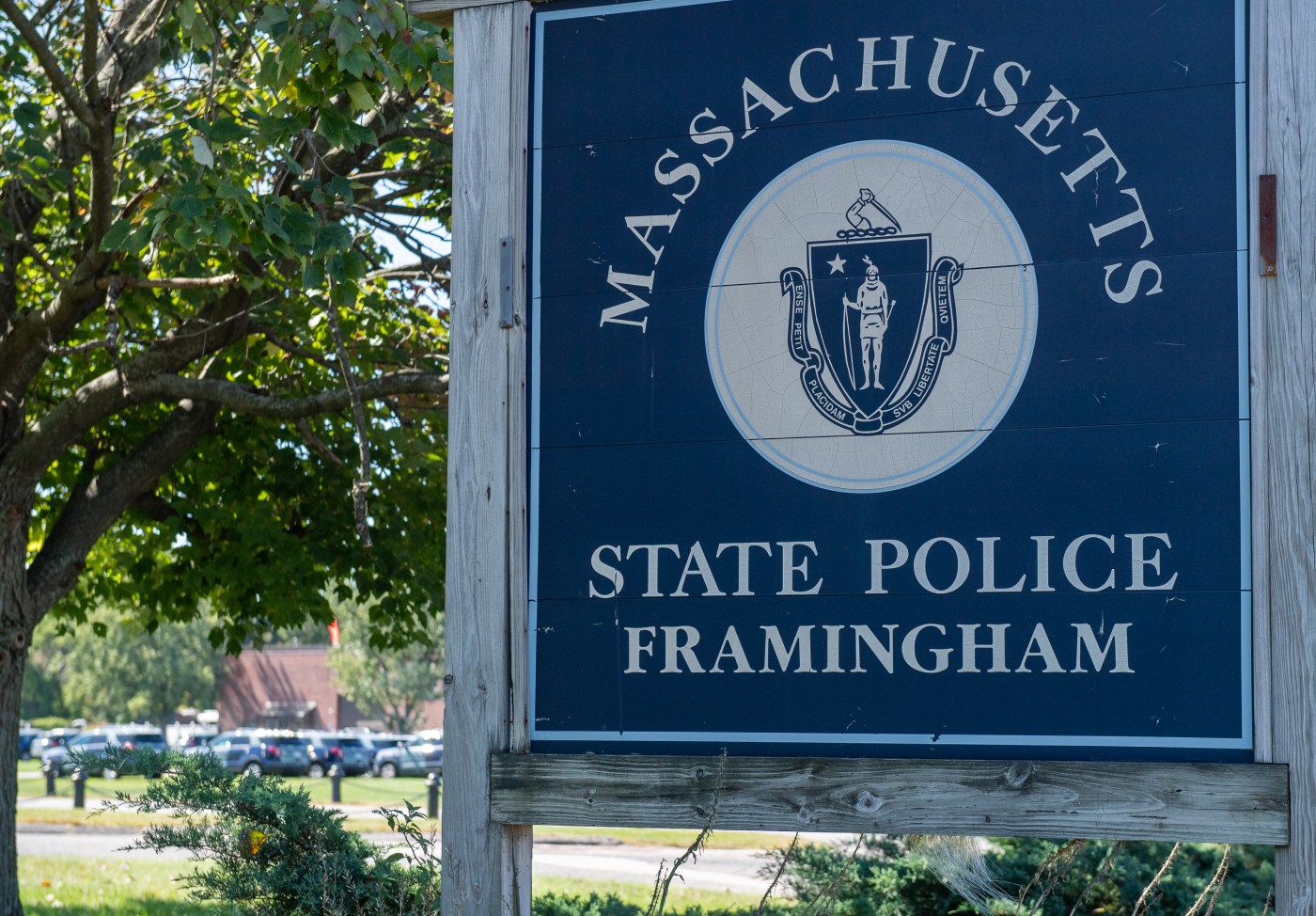
Massachusetts State Police trooper’s sexual discrimination lawsuit has new life after Appeals Court partial win
A statie who filed a sexual discrimination lawsuit against Mass State Police after she reportedly caught a fellow trooper having sex while on duty has scored a win in her appeal.
Kathryn Downey’s suit against the scandal-plagued department, involving porn on a hard drive and an infamous taser prank, has new life following the Massachusetts Appeals Court ruling this week.
Downey — who alleges that she was treated differently than male troopers — had initially filed the sexual harassment, discrimination and retaliation lawsuit in 2018 against Mass State Police and trooper Earl Johnson. The suit was eventually dismissed by a Suffolk Superior Court judge.
Downey then appealed the Suffolk Superior dismissal, and this week the state Appeals Court ruled that her entire lawsuit should not have been tossed. The discrimination part of the suit now has a second chance, as the case will be put back on the docket in Superior Court.
“We vacate that portion of the summary judgment related to Downey’s claims under G. L. c. 151B and Title VII (discrimination) premised on a theory that the State police engaged in disparate treatment by treating Downey less favorably than Johnson, (Steven) Wohlgemuth, or both,” the Appeals Court wrote.
Downey’s attorney, Leonard Kesten, said he was always confident the Appeals Court would reverse the Superior Court ruling.
“She was clearly treated differently than the men involved in this situation,” Kesten told the Herald on Friday. “All she wanted was equal treatment.”
Downey, now a State Police captain who took home $207,000 last year, used to be the defensive tactics instructor at the State Police Academy. There, she became romantically involved with Johnson — who was the defensive tactics training curriculum coordinator, who as a trooper made $164,000 last year.
Back in June 2016, according to the suit, Downey entered Johnson’s office to access training materials — a “not uncommon” occurrence for Downey and other academy instructors. While there, she noticed a personal credit card bill on Johnson’s desk, which included a charge for a hotel stay while he was apparently on duty.
Downey later that day returned to Johnson’s office for an external hard drive that Johnson had attached to his State Police computer. Although the hard drive was Johnson’s personal property, Johnson also used it to store work-related materials and allowed his co-workers to access it.
“Downey discovered a folder containing sexually explicit photographs and video footage of, among other things, Johnson masturbating and engaging in sexual activity with other women,” reads the background in the Appeals Court ruling.
Downey ended her romantic relationship with Johnson later that day.
Johnson also allegedly admitted to her that he had met a woman at a hotel for sex — consistent with the credit card bill, and during the timeframe that he would have been on duty.
As a result of all this, Downey submitted a complaint — detailing the porn images and videos on the hard drive, along with the sex while on duty allegation. Johnson was permanently transferred out of the academy where he had been assigned for 10 years, and he was “very unhappy” about the transfer.
Then on the same day that Johnson received notice of his permanent transfer, he filed a complaint against Downey involving a taser incident from 13 months earlier.
Downey had reportedly aimed her taser at Johnson while they and two other defensive tactics instructors — troopers Wohlgemuth and David Lahair — were cleaning up the gym after a taser training session.
Unbeknownst to Johnson, Downey had loaded her taser with an “inert” or “training” cartridge that had been altered to look like a “live” cartridge, so the barbs would bounce off the target. Downey deployed the taser, hitting Johnson in the hip and abdomen before the blunt metal pieces bounced to the ground.
“Downey admitted to firing the taser, but explained that she had intended only to ‘prank’ Johnson; that the prank was Wohlgemuth’s idea and that he had showed her earlier on the day of the incident how he had altered inert cartridges to look like live ones; and that Wohlgemuth provided the altered cartridge used in the prank,” the ruling reads.
Downey and Wohlgemuth both expressed that they believed Johnson’s complaint was in retaliation for Downey’s prior complaint against Johnson.
Downey ended up being permanently transferred out of the academy, and she appealed her discipline to the State Police trial board. She eventually received a letter of reprimand.
Related Articles
Howie Carr: Unspeakable stench of our Massachusetts State Police
Massachusetts State Police watchdog pushes again for probe of embattled agency
Howie Carr: Proctors, er troopers, dominate Karen Read trial circus
Watchdog says Healey should launch ‘stem to stern’ review of State Police
Howie Carr: Incompetent six-figure Massachusetts State Police owe us a refund
She then filed the lawsuit for sexual harassment, discrimination and retaliation. The Appeals Court agreed with the Superior Court about tossing out the sexual harassment and retaliation sections, but the discrimination suit can move forward.
“Downey contends that she was treated less favorably than her male counterparts in connection with the State police investigations of employee misconduct and the imposition of discipline,” the Appeals Court ruling reads.
She compared her situation to Johnson’s in the suit. A jury could conclude that the State Police did not conduct an investigation of all of Johnson’s alleged misconduct, but did of Downey’s, according to the court.
“For example, even though Johnson admitted to investigators that it was possible that his tryst at the hotel occurred while he was on duty, and had candidly admitted privately to Downey that it was, there is no evidence in the record that the State police checked the hotel or Johnson’s credit card records, or interviewed his coworkers as to his whereabouts that day,” the Appeals Court ruling reads.
“Similarly, the State police did not review the hard drive, although there were questions about the folder name or names where the pornography was stored,” the ruling adds. “The State police confined the interviews to Johnson and Downey, even though coworkers in the academy who had access to the hard drive might have provided valuable information on the scope of Johnson’s misconduct.”
A Mass State Police spokesperson said in a statement Friday, “We will not comment as this litigation remains active.”
The state is currently looking to hire a new leader of the embattled agency.
“I hope the new colonel will take these things seriously,” said Downey’s attorney, Kesten, adding about this lawsuit, “Hopefully this helps usher in a new day.”


